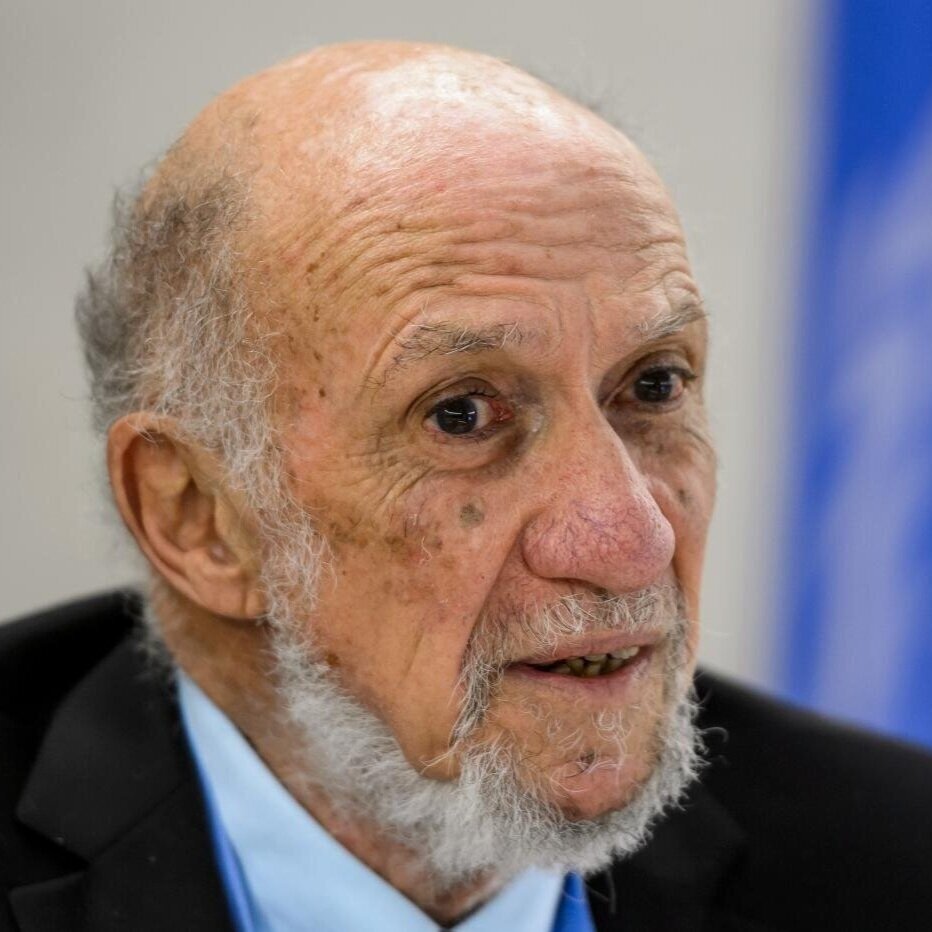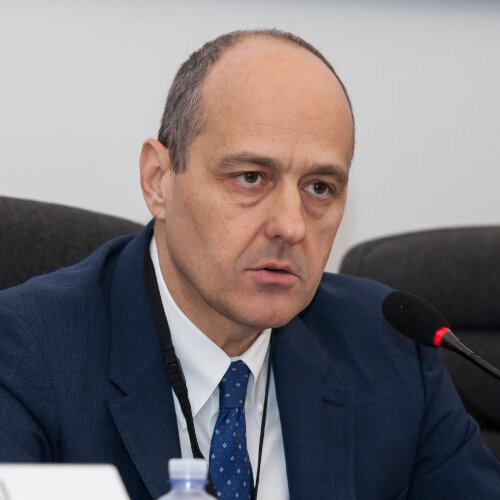
Jan Philipp Albrecht
(Germany) Jan Philippe Albrecht is a European and German politician recognized for his significant contributions to digital civil rights. As a member of the EU Parliament, he notably served as the Vice-Chair of the European Parliament Committee on Civil Liberties, Justice, and Home Affairs, emphasizing his commitment to civil liberties. From 2018 to 2022, he took on the Minister for Energy, Agriculture, the Environment, Nature, and Digitalization role in the German State of Schleswig-Holstein, enhancing his impact on environmental and digital policy.
Additionally, Jan Philippe is a member of NOYB – European Center for Digital Rights, an organization spearheaded by Max Schrems that focuses on protecting digital privacy. He currently leads the Heinrich Böll Foundation as its President, driving initiatives promoting the environment, civil rights, and multilateral democracy across 30 countries with a dedicated staff of 180.

Amb. Muhhamadou Kah
(Gambia) Amb. Prof. Muhammadou M.O. Kah currently serves as the Chairman of the UN Commission on Science and Technology Development and the Ambassador Extraordinary and Plenipotentiary of The Gambia to Switzerland and the Permanent Representative of The Gambia to the United Nations organizations at Geneva (UNOG), the World Trade Organization (WTO), and other international organizations in Switzerland. His distinguished career also includes his role as Vice Chancellor/Rector of The University of The Gambia, where he made history as the institution’s third and first Gambian-born leader. He has further enhanced academic and technological landscapes internationally as the Provost/Vice President for Academic Affairs at the American University of Nigeria, Yola, and the Vice-Rector for Technology and Innovation and Founding Dean of the School of IT and Engineering at ADA University in Baku, Azerbaijan.
In addition to academic and diplomatic responsibilities, Amb. Prof. Kah has held numerous significant positions in the financial and educational sectors. He was the founding chairman of Zenith Bank Gambia Limited and served on the Governing Board of The African University of Science and Technology in Abuja, Nigeria. He was a founding Board member of The International Digital Health and AI Research Collaborative (I-DAIR) in Geneva, Switzerland, and a Governing Council Member of the DCAF-Geneva Center For Security Sector Governance Foundation. His leadership extends to his past role as Chairman of the Africa Group of Ambassadors in Geneva from April 2021 to September 2021, Vice President (Africa) for the UN Human Rights Council for 2022 and 2023, Vice Chairman for UNCTAD’s Commission on Science and Technology for Development, and as a member of the Advisory Board of the UNCTAD Trade and Development Bureau from June 2021 to July 2023. He also served as one of two Ambassadors designated as Friends of the Chair of the World Intellectual Property Organization (WIPO) General Assembly. He continues his involvement as one of the Vice Chairs of the General Assembly of WIPO.

Flynn Devine
(UK) Flynn Devine is a dedicated researcher focused on AI governance. His notable contributions include leading the 'The Recursive Public' project, funded by OpenAI's Democratic Inputs to AI grant. This initiative explores the interplay between artificial intelligence and democratic processes. He is also involved with the Collective Intelligence Project, enhancing collaborative approaches to complex problem-solving in AI.
Previously, Flynn was part of the Public Policy program at The Alan Turing Institute, where he applied data science and artificial intelligence to address key policy challenges. Additionally, he co-initiated the Global Assembly for COP26, facilitating international discussions on climate action and sustainable policy.

Paul Nemitz
(Belgium) Paul Nemitz currently serves as the Principal Adviser on Justice Policy at the EU Commission, where his expertise guides significant policy developments. Additionally, he is a member of the German Data Ethics Commission and the Global Council on Extended Intelligence, reflecting his deep commitment to ethical standards in data use and artificial intelligence. He also holds a position as a Visiting Professor of Law at the College of Europe, where he imparts his extensive knowledge to the next generation of legal professionals.
Previously, Paul was the Director of Fundamental Rights and Union Citizenship and later a Principal Advisor at the Directorate-General for Justice of the European Commission. In these roles, he led pivotal work on the GDPR and the EU–US Privacy Shield, focusing on data protection and privacy within law enforcement and national security frameworks.

Akash Wasil
(USA) Akash Wasil is an AI Policy Researcher at Control.AI, specializing in the critical field of AI governance. Previously, he served as an AI Governance Researcher at the Center for AI Safety in Berkeley, California, and as an Analyst at the Stanford Existential Risks Initiative, where he contributed to understanding and mitigating risks associated with advanced AI technologies.
Akash graduated Phi Beta Kappa in Psychology from Harvard University, where he distinguished himself academically and laid a solid foundation for his contributions to the intersection of technology and policy.

Ansgar Koene
(Belgium) Ansgar Koene serves as the Global AI Ethics and Regulatory Leader at Ernst & Young, one of the world's top five consultancy firms. His leadership extends to his role as Chair of the IEEE Working Group P7003 Standard for Algorithm Bias Considerations, where he focuses on developing ethical guidelines for AI applications. Additionally, he is a Trustee at the 5Rights Foundation, advocating for children's digital rights.
Angsar is also a member of the AI Ethics Board at Hayden AI, contributing his expertise to guide the development of responsible AI technologies.

Mika Lauhde
(Finland, Luxembourg) Mika Lauhde leads the IT R&D department at the International Committee of the Red Cross, focusing on developing innovative technological solutions to enhance humanitarian efforts worldwide. Before this role, he was the Global Vice-President of Cyber Security and Privacy at Huawei Technologies, where he spearheaded initiatives to strengthen global data protection and privacy protocols.
His extensive background in security also includes serving as the Head of Business Security and Continuity at Nokia for 13 years, where he was integral in establishing robust security frameworks. Mika has been an influential figure in cybersecurity policy, having been a member of the ICT Security Advisory Board of the Republic of Finland, the European Network and Information Security Agency (ENISA), and the EU Commission’s Network and Information Security (NIS) platform. Additionally, he contributed to the EU Commission security advisory board under Commissar Redding and was a Trust In Digital Life founding board member.

Richard Falk
(USA) Richard Falk is a renowned Professor Emeritus of International Law at Princeton University. He is recognized globally as a leading academic in the field of global democratic governance. His tenure has established him as a pivotal figure in discussing and advancing international legal frameworks and democratic principles.
From 2008 to 2014, he served as the UN Human Rights Council Rapporteur on the situation of human rights in the Palestinian territories, highlighting his commitment to human rights irrespective of his Jewish descent. Professor Falk is also the Chairman of the Board of the Nuclear Age Peace Foundation. A prolific scholar, he is the author or co-author of over 20 books, and the editor or co-editor of another 20 volumes focused on promoting global democratic governance reform and institution building.

Gordon Laforge
(USA) Gordon Laforge is a Senior Policy Analyst at the New America Foundation, specializing in global AI governance and geopolitics. His expertise in this field is recognized internationally, and he contributes to influential policy developments. Previously, he was a Senior Researcher at Princeton University, conducting extensive studies on technology and international relations.
A Fulbright Fellow, his academic and professional accomplishments reflect a deep commitment to understanding and shaping the strategic implications of artificial intelligence on a global scale.

James S. Fishkin
(USA) James S. Fishkin is a Tenured Professor of Communication and Political Science at Stanford University, where he also serves as the Director of the Center for Deliberative Democracy. His academic and leadership roles at Stanford have positioned him at the forefront of research and education in political communication and democratic theory.
His notable contribution to the field, Deliberative Polling, was introduced in 1988 and has since gained global recognition as an effective method for public consultation. Professor Fishkin’s scholarly works, including "When the People Speak" (2009), "Deliberation Day" (2004, co-authored with Bruce Ackerman), and "Democracy and Deliberation" (1991), explore the complexities and practicalities of fostering deliberation in democratic processes.

Mohamed Farahat
(Egypt) Mohamed Farahat serves on the United Nations High-Level Advisory Board for Artificial Intelligence, contributing to shaping global AI strategies and ethical guidelines. He is also a member of the Multistakeholder Advisory Group of the African Internet Governance Forum, engaging in discussions that influence the continent's internet policy framework.
As a legal and political researcher, he has authored 20 published articles addressing various topics, including international refugee law, statelessness, politics, democracy, parliamentary studies, digital rights, and internet governance. His scholarly work informs and impacts ongoing debates and developments in these critical fields.

Elisabetta Trenta
(Italy) Elisabetta Trenta holds distinguished credentials as a Former Minister of Defense of the Republic of Italy and a Former Security and International Relations Professor at Link Campus University of Rome. With a career marked by exemplary service and scholarly contributions, she brings a wealth of expertise to national security and international relations.
In addition to her tenure in ministerial leadership, Elisabetta Trenta brings over 20 years of extensive experience as a senior intelligence and security analyst. Her illustrious career encompasses significant roles within the Italian Ministry of Foreign Affairs, where she played a pivotal role in shaping strategic initiatives. Furthermore, Elisabetta Trenta has collaborated with several esteemed think tanks, leveraging her expertise to foster international cooperation and address complex security challenges on a global scale.

Camila Lopez Badra
(Argentina) Camila Lopez Badra currently serves as the Chair of the Outreach Committee of the World Federalist Movement and as the International Director of the United Nations Parliamentary Assembly Model. In addition, she is the Executive Director of Democracia Global – Movimiento por la Unión Sudamericana y el Parlamento Mundial, driving initiatives that advocate for greater regional and global political integration.
Beyond her leadership roles, Camila coordinates the campaign to establish a Latin American and Caribbean Criminal Court against Transnational Organized Crime (COPLA). She also serves as a Parliamentary Advisor in the Honorable Chamber of Deputies of the Argentine Republic. Apart from her extensive political and advocacy work, she is a passionate tango teacher, blending her professional pursuits with cultural engagement.

Tjerk Timan
(France) Tjerk Timan is a PhD scientist with a specialization in Trustworthy AI, digital privacy, and security. His expertise positions him at the forefront of technology policy and ethical AI practices. He serves as the Principal Consultant at Technopolis Group, instrumental in shaping high-impact innovation strategies and technology policies.
Previously, Tjerk was a Senior Scientist in Strategy & Policy for AI at TNO Group. In this role, he focused on developing and integrating ethical guidelines and policy frameworks to govern the deployment of artificial intelligence technologies.

Chase Cunningham
(USA) Chase Cunningham serves as the Chief Strategy Officer at Ericom, where he shapes strategic initiatives and drives technological advancements within the company. Before joining Ericom, he was Chief Cryptologic Technician at the National Security Agency (NSA), leading technical teams across multiple operations in collaboration with the FBI and CIA. His leadership facilitated significant advancements in national security projects.
Chase’s extensive background includes roles such as Vice President and Principal Analyst at Forrester Research, where he developed the Zero Trust eXtended framework. Additionally, he has served as the Director of Threat Intelligence at Armor and Director of Cyber Analytics at Decisive Analytics, enhancing cybersecurity measures through innovative analytical strategies.

BORIS TARATINE
(UK) Boris Taratine is a leading global cybersecurity executive with extensive expertise in the financial sector. His experience includes roles as Chief Cybersecurity Architect at Lloyds Banking Group and Principal Security Architect at VISA, where he played a pivotal role in enhancing security architectures within these major financial institutions. He is pursuing a PhD in Physics at the University of St. Petersburg, Russia, demonstrating his deep commitment to advancing scientific and technical knowledge.
In addition to his professional and academic pursuits, Boris holds dozens of patents in physics and cyber defense. As a citizen of the UK, Canada, and Russia, he actively promotes freedom of speech and seeks to mitigate the impacts of global propaganda and the fight for informational superiority.

Aicha Jeridi
(Tunisia) Aicha Jeridi is the Vice President of the North African School and Forum of Internet Governance. In this role, she significantly influences the development and implementation of Internet governance policies in the region, fostering dialogue and collaboration among key stakeholders.
Additionally, Aicha is a member of the African Union Multi-Stakeholder Advisory Group on Internet Governance. This involvement allows her to contribute to broader discussions and initiatives to improve digital infrastructure and governance across the African continent.

Daniel Archibugi
(Italy) Daniel Archibugi is a world-renowned expert in global governance and global constituent processes, specializing in the development of accountable global institutions. His extensive academic career includes teaching positions at prestigious universities such as Sussex, Naples, Cambridge, Rome Sapienza, Rome LUISS, the London School of Economics and Political Science, and Harvard.
Daniel holds the Professor of Innovation, Governance, and Public Policy position at the University of London, Birkbeck College, School of Business, Economics, and Informatics. He advises prominent international organizations, including the European Union, Council of Europe, OECD, and several UN agencies. Additionally, he has contributed significantly to research as the Research Director at the Italian National Research Council (CNR) in Rome. He is the author of numerous books on global governance and UN reform.

Toufi Saliba
(USA) Toufi Saliba is the President of the Decentralized AI Alliance and the esteemed Global Chair for International Protocols for AI standards at IEEE, the world's largest technical professional organization. With a remarkable track record in the convergence of decentralized digital technologies, artificial intelligence, and democratic governance, Toufi is recognized as a leading authority in the field.
In addition to these pivotal roles, he serves as the CEO of Toda.Network, a decentralized network protocol poised to revolutionize digital infrastructure. Furthermore, Toufi leverages his expertise as CEO of PrivacyShell, providing cybersecurity advisory services to large organizations and nurturing cybersecurity startups toward success.

Paolo Lezzi
(Switzerland) Paolo Lezzi is a renowned expert in intelligence-grade cybersecurity, distinguished by his role as the Founder and CEO of In The Cyber. This esteemed company stands at the forefront of providing state-grade lawful spyware systems, solidifying Paolo’s position as a pioneer in the industry. Notably, in 2019, In The Cyber acquired the Italian Hacking Team, a globally recognized leader in spyware technology.
In addition to his entrepreneurial endeavors, he serves as the Chairman of Conferenza Nationale sulla Cyberwarfare, Italy's premier conference dedicated to cyber warfare. Furthermore, Paolo holds the esteemed position of Executive Vice President at the European Center for Advanced Cybersecurity (EUCACS), contributing to the advancement of cybersecurity initiatives on a continental scale.




















